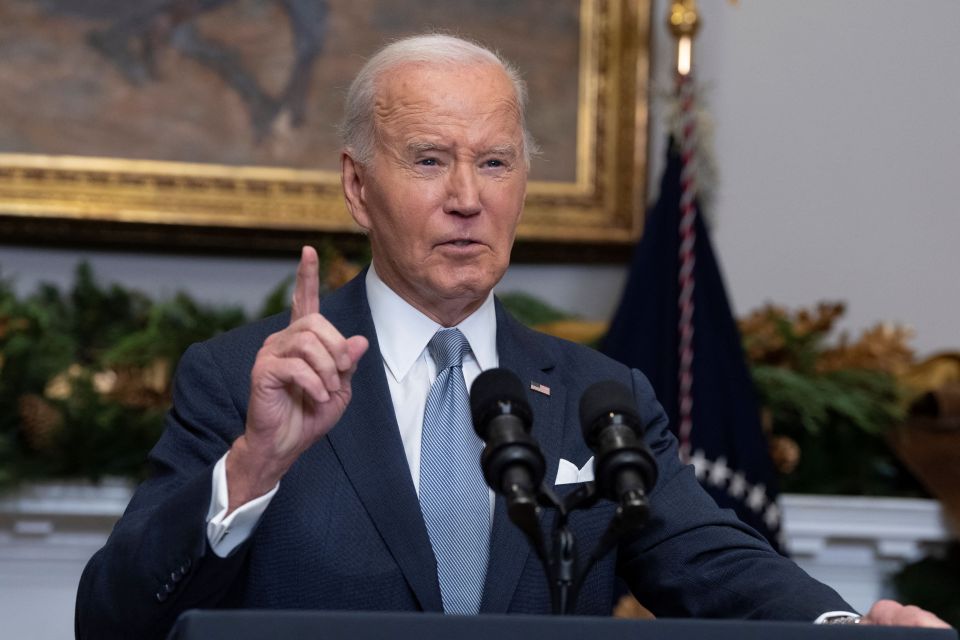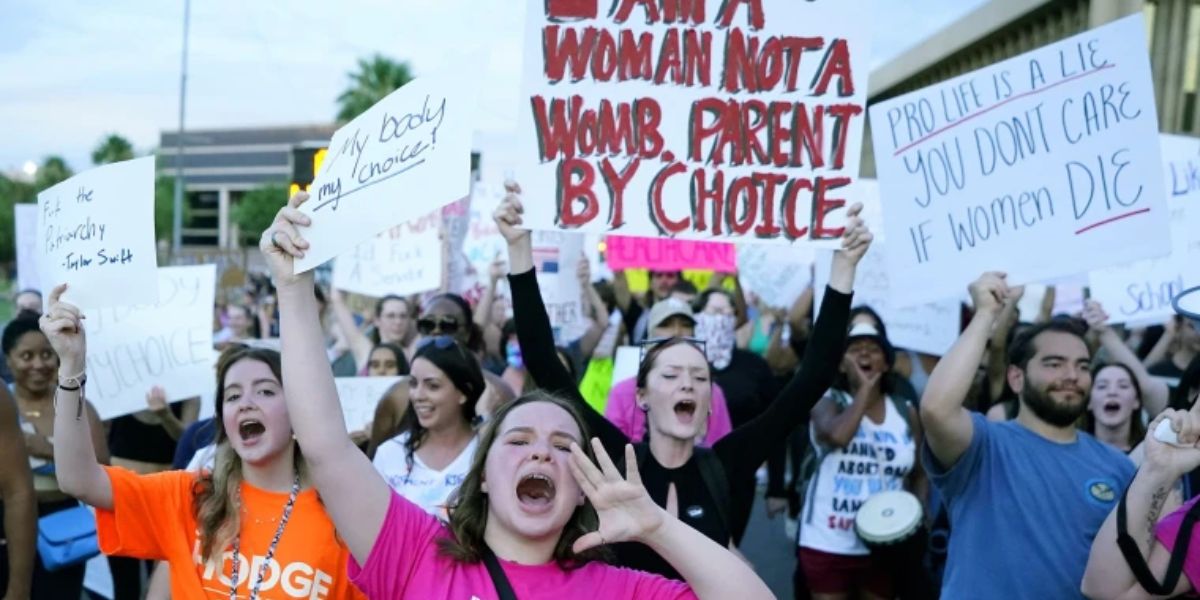Arizona’s Repeal of 1864 Ban Marks Beginning, Not End, of “ABORTION” Struggle
A Texas woman was compelled to leave the state in order to have a nonviable pregnancy terminated, as her doctor recommended. Doctors speak with administrators and lawyers before delivering emergency care to pregnant women. A woman in Florida was forced to deliver a stillborn fetus alone in a restroom, resulting in life-threatening blood loss.
These are just a few examples of the repercussions of tight abortion bans enacted in other states, according to abortion rights supporters, that women and health care providers in Arizona will experience if a Civil War-era abortion ban is implemented next month. On April 9, the Arizona Supreme Court found that a near-total abortion ban first established in 1864 was enforceable, provoking outrage among pro-choice supporters and some Republicans who, while anti-abortion, knew that supporting such a tight ban would be politically unpopular.
The state Legislature then engaged in a weeks-long battle, with Democrats and five Republicans eventually voting to abolish the ban. However, like with nearly every law approved this year, the repeal will not take effect until 90 days after the end of the yearly legislative session. As budget deliberations progress slowly, there is little indication that the session will end soon.
So, unless the state Supreme Court provides a stay in the case, the prohibition might remain in effect for months before the repeal becomes law.
On Wednesday, a group of Arizona doctors and abortion rights advocates from the Committee to Protect Health Care urged voters to support the Arizona Abortion Access Act, which is scheduled to appear on the November ballot. It would make abortion available until fetal viability (approximately 24 weeks of pregnancy) a right guaranteed by the state constitution.
The Committee to Protect Health Care is a national advocacy group and political action committee comprised of thousands of doctors who strive to increase healthcare access, reduce prices, and protect reproductive freedom.
“Politicians with no medical training or expertise shouldn’t be interfering in emergency departments or exam rooms,” Dr. Atsuko Koyama, an abortion provider at Camelback Family Planning in Phoenix and a pediatric emergency medicine physician, said during the Wednesday press conference.
There are no exceptions for victims of rape and incest in either the 1864 ban or the current 15-week ban. The 15-week prohibition, imposed by Republicans in 2022, will go back into effect when the previous ban is abolished.
“The only exception is an ambiguous one that’s left to broad interpretation, which is to save a woman’s life,” said Dr. Cadey Harrel, a Tucson family physician and the Arizona representative for the Committee to Protect Health Care.
Harrel expressed concern that the 160-year-old restriction may force women who cannot afford to leave the state for care, including those who have been victims of horrendous crimes or whose pregnancies are not viable, to remain pregnant against their will. “Arizonans deserve better than this, they don’t deserve either of these fates,” she stated. “They don’t deserve to have politicians playing games with their health, freedom, and their livelihoods.”
Koyama emphasized that what constitutes a medical emergency is not always black and white and that not all emergencies are instantly life-threatening. She claimed the bans are intended to “confuse and instill fear among physicians,” resulting in delayed care and even death.
She claims that these bans push clinicians to ask themselves questions such as, “Is this patient close enough to death to intervene?” How bad does my patient have to get before I can take the action that I know would save their health, fertility, or life? Will this patient be less likely to die and unable to undergo a life-saving abortion if I give her this blood transfusion or stabilizing medication?”
The abortion practitioner stated that she had witnessed numerous examples of emergency abortions saving patients’ lives, such as when a patient had a premature rupture of membranes at 17 weeks of gestation and was showing signs of serious infection. The patient was at risk of becoming septic, which might result in infertility and death.
“For all Arizonans, this is an issue of personal freedom, privacy and for many of our patients, it’s an issue of health,” Koyama stated. Tucson physician Jasleen Chhatwal believes that abortion bans can create serious mental health problems.
“Banning access to safe and legal abortions forces women into potentially dangerous situations, increasing the risk of emotional distress, trauma, and long-term psychological consequences,” she stated.
Chhatwal told the case of Kate Cox, a Texas woman who, with her doctor, requested legal authorization to end a nonviable pregnancy in December 2023. The Texas Supreme Court dismissed their motion, forcing her to travel out of state to seek an abortion. “She’d been in the emergency room four times in one month for pregnancy complications, her health and future fertility at risk,” Chhatwal stated.
She also discussed what happened to Anya Cook, a Florida lady, in 2022, when her water broke at 16 weeks, just past the 15-week restriction. However, because the fetus still showed heart activity, emergency department doctors were unable to execute the abortion.
“Because of Florida’s abortion ban, Anya was forced to deliver a stillborn fetus alone in a bathroom, losing so much blood it threatened her life,” Chhatwal stated. “These awful, horrific stories should not happen anywhere, including Arizona. However, they will continue to occur if we leave reproductive freedom up to political will.”
Dr. Valerie Sorkin-Wells, a retired Scottsdale OBGYN and obstetrics and gynecology professor urged voters to support the Arizona Abortion Access Act in November, which would restore women’s abortion rights under Roe v. Wade until the United States Supreme Court overturned it in June 2022.
“The Arizona Abortion Access Act is based on Arizona values and that Arizonans have the right to individual autonomy, including the right to make their own health care decisions without unnecessary government interference,” Sorkin-Wells stated.
She also refuted an often-repeated allegation made by anti-abortion activists: that because the act would allow abortion beyond fetal viability — to safeguard the woman’s physical or mental health – abortions would be permitted until birth. “Abortions up to term are not a thing,” Sorkin-Wells stated. “No one performs abortions up to term. The goal is to eliminate the gestational age requirement so that physicians can make judgments in our exam rooms and with patients free of political influence.”
Suicidal ideation, substance abuse issues, and drug overdoses are some of the mental health reasons that may necessitate abortion after 24 weeks, she explained. According to Sorkin-Wells, abortion may be essential after that point for very young victims of sexual assault who do not realize they are pregnant until after the period of viability has passed.
The opposite side
While abortion rights advocates work to spread the word about their November ballot initiative, anti-abortion activists work to persuade the Arizona Supreme Court not to halt implementation of the 1864 ban, as Democratic Attorney General Kris Mayes and Planned Parenthood Arizona have both requested.
The court immediately denied Mayes’ original plea to review its April 9 ruling, but has yet to rule on motions from the attorney general and Planned Parenthood to postpone enforcement of the near-total ban until she decides whether to appeal it to the United States Supreme Court.
On Tuesday, attorneys for Dr. Eric Hazelrigg, an obstetrician and medical director of Choices Pregnancy Center, and Yavapai County Attorney Dennis McGrane submitted a motion requesting the court to enact the prohibition, claiming it reflects the real desire of the state Legislature. The filing describes Hazelrigg as “guardian ad litem (a court-appointed guardian) of all Arizona unborn infants.”
Choices prenatal Center is a nonprofit in the Valley that offers free prenatal care and information but does not perform or refer to abortions.
“Life is a human right, and Arizona’s pro-life law respects that fundamental right,” Jake Warner, an Alliance Defending Freedom lawyer, stated in the petition. “Arizona’s pro-life law has been protecting unborn children for over 100 years. While we are deeply saddened by the legislature’s recent vote to repeal the law, it will not take effect immediately, as the legislature intentionally decided.” We urge the Arizona Supreme Court to uphold the state’s pro-life law and safeguard as many innocent unborn children as possible.”
The Alliance Defending Freedom (ADF) is a conservative Christian legal advocacy organization.
In the lawsuit, Warner claimed that the Arizona Legislature could have added an emergency language in the repeal, allowing it to take effect immediately, but did not. Warner believes this indicates that legislators do not want the repeal to take effect immediately.
“In truth, the legislature had insufficient votes to prioritize abortion providers over unborn children for the next few months,” Warner said, adding that he does not believe delaying the law’s passage will honor “the will of the Arizona electorate.” “Respondents seek an unjust delay,” he wrote. “They also seek judicial approval for abortions the legislature has forbidden.”
Warner requested that the court refuse Mayes and Planned Parenthood’s requests and instead proceed with enacting the ban.











